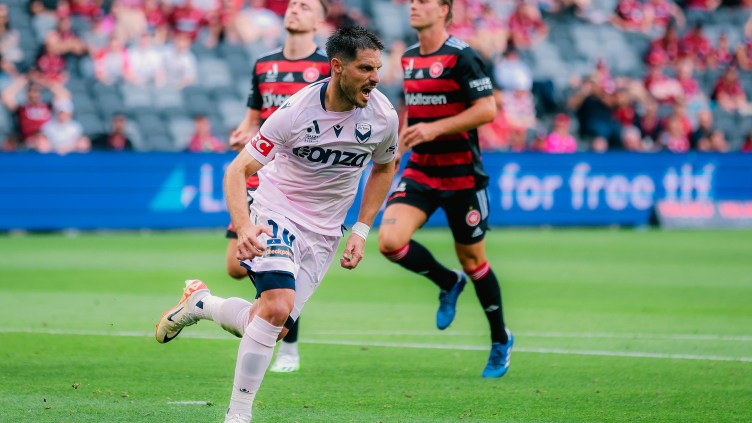In the third and final article of a series where he talks about Melbourne Victory’s championship-winning season, Melbourne coach Ernie Merrick tells Sportal’s Bren O’Brien about the importance of confidence in the team’s treble-winning 2008/09 season.
In the third and final article of a series where he talks about Melbourne Victory’s championship-winning season, Melbourne coach Ernie Merrick tells Sportal’s Bren O’Brien about the importance of confidence in the team’s treble-winning 2008/09 season.
It may seem surprising that Ernie Merrick spends more time working on the confidence of his players than any other aspect of the game. But the Melbourne coach believes the key to getting the most out of a player is to make him believe that he can do what is asked of him. While he often keeps a lid on it in the public arena, he believes that players can never have too much confidence.
After Melbourne smashed Adelaide 6-0 on aggregate in the Major Semi-Final, the media talk was that only overconfidence or complacency could prevent Victory from taking the championship. But for Merrick, he was never concerned that his players felt they had the title in the bag.
“I don’t believe in overconfidence. This is my thinking. The more confident the players are the better. I try and instil confidence in players. I probably spend more time on that than anything during coaching sessions,” he said.
“Technical skills coaching and fitness work is important and I delegate a lot of that stuff. The strategy and tactics are crucial at this level and I do a tremendous amount of work in this area but it’s about giving players confidence in their ability to perform, especially when the risk of failure is high. Performing at optimum level in front of a large audience and under extreme fatigue is very difficult psychologically. Especially when the result means so much, and the expectation’s so high. Full confidence in one-s ability is vital. Too much confidence is not possible in my book.”
Merrick said the only concern with players is when they get complacent. But rather than complacency being a by-product of over-confidence, Merrick defines it as a deliberate act which can affect the balance of a team.
“My definition of complacency is someone making a conscious decision to deliberately not do their job. As a coach, strategy is all about every player knowing and accepting their two on-field jobs. They all have a role defensively and a role offensively. They are given a lot more freedom offensively, but their discipline in defence is non-negotiable,” he said.
“Complacency is one player saying ‘I don’t have to chase him back’, ‘I don’t have to make that run into the goal’, ‘I don’t have to put the cross in early like I’ve been coached to’, ‘I have decided that I’m not going to do that’. Now, nobody in the team knows what this individual is going to do. He is not fulfilling his role within the team according to the strategy. Added to that, another player in the team has got to perform an extra task to make up for him,” he said.
The Melbourne players were over the moon after the Major Semi-Final triumph, but rather than try to settle his players and focus them on the Grand Final, Merrick let his men enjoy their performance.
“Right after the second leg of the semi-final, we didn’t say, ‘that’s not the Grand Final, we are not there yet.’ It was fantastic, it was a great result but overall it was a great performance and it’s the performance that matters. And it-s the performance that instils more confidence,” he said.
The coach’s perspective on a successful season is very much different to that of a journalist or a fan. While outsiders tend to see the year as an evolving narrative, with defining moments from which the framework of the story is hung, Merrick does not tend to reflect on key instances as important to his team’s success.
He is already on the record as saying that he didn’t view the match against Sydney, where Melbourne trailed 2-0 before winning 3-2 and then going on to win eight of the final nine games of the season, as a turning point.
He has a similar view of the goal which Archie Thompson scored in the 90th minute of the match against Wellington. It turned out to be the goal that won Melbourne the premiership, as Victory edged out Adelaide on goals scored with both teams even both on points and goal difference at the end of the season.
“I don’t think that’s because of one goal. That’s the way the media likes to write it up. It’s exciting, and it was a great goal. But it’s about how you start the season, how you go through the middle phase, and how you finish, it’s an endurance race. It-s about consistency week in and week out. It’s not a sprint that comes down to that one goal. All the goals are crucial all the way through and all the defending at our end,” he said.
“They were all as important as a last-minute goal. All those clean sheets, all those last-minute saves. Theo tipping the ball around the corner, they are all important to us.”
It may sound like Merrick is being diplomatic, but he genuinely believes that football is not defined by individual moments, but by the processes that take place throughout.
The concept of a Grand Final is not necessarily conducive to that thinking. But in the lead up, Merrick was insistent that nothing would change. He believed, and given the results of the Major Semi-Final he had good reason for that belief, that his team needed to do what it did best and not change too many things.
But in saying that Merrick was very aware that Grand Finals are different to other games, in particular in the mental pressure on the players.
“I once spoke to an athletics coach whose athlete had won an Olympic sprint. The coach’s viewpoint was if his athlete ran the race with ultimate concentration and intensity then afterwards they’ll feel like they have been in a car accident. That’s the sort of impact an enormous effort can have on the body. I feel that way about a Grand Final,” he said.
“Unless you are prepared to go through that enormous mental and physical stress and maintain a confidence that you can still do your job, then you won’t achieve a championship. A lot of the Melbourne Victory players felt like that.”
Merrick’s expectation of the game was to prove correct. In contrast to the two legs of the semi-final, it was a tight and tough decider where Tom Pondeljak’s 60th-minute effort was to prove the difference between the two sides, who both finished with 10 men.
“My recollection of the match, and it’s the only game of the year that I don’t analyse, is that it was always going to be a tough, tense game. I remember talking to someone prior to the kick-off predicting that it would be very close,” he said.
“I thought that Adelaide, with 10 players, played really good football. They played with a compact defence and counter-attacked rapidly. The longer the game continued, without them getting the equaliser, the more they just came at us. On a number of occasions we could have caught them out since they were exposed at the back, but we failed. That meant Adelaide was always in with a chance. We have always had respect for Adelaide and we knew that the Grand Final was not going to be an easy game.”
“But on the other hand I was confident in our ability, our strategy and our mental toughness.”
The overwhelming feeling in discussing the season with Merrick is he believes that if the campaign was defined by anything it was that mental strength. It’s a strength that was embodied by the captain Kevin Muscat and flowed right through the club. It is that strength which saw five of the starting XI play injured in the decider and it was that strength that allowed Melbourne to create its own piece of history and further enhance Merrick’s reputation as a manager.



